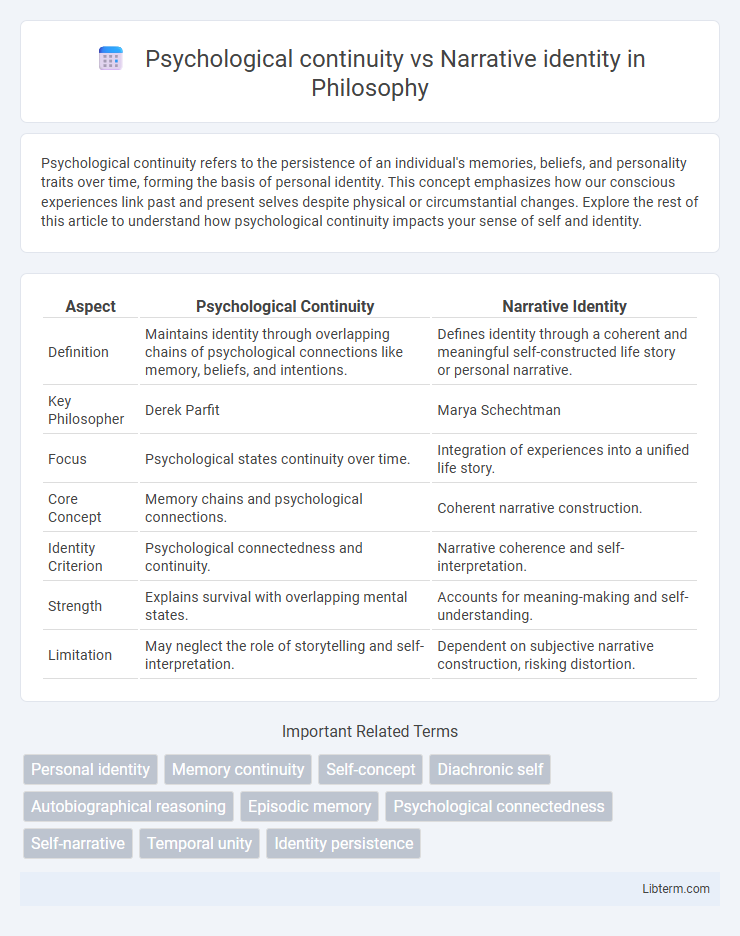Psychological continuity refers to the persistence of an individual's memories, beliefs, and personality traits over time, forming the basis of personal identity. This concept emphasizes how our conscious experiences link past and present selves despite physical or circumstantial changes. Explore the rest of this article to understand how psychological continuity impacts your sense of self and identity.
Table of Comparison
| Aspect | Psychological Continuity | Narrative Identity |
|---|---|---|
| Definition | Maintains identity through overlapping chains of psychological connections like memory, beliefs, and intentions. | Defines identity through a coherent and meaningful self-constructed life story or personal narrative. |
| Key Philosopher | Derek Parfit | Marya Schechtman |
| Focus | Psychological states continuity over time. | Integration of experiences into a unified life story. |
| Core Concept | Memory chains and psychological connections. | Coherent narrative construction. |
| Identity Criterion | Psychological connectedness and continuity. | Narrative coherence and self-interpretation. |
| Strength | Explains survival with overlapping mental states. | Accounts for meaning-making and self-understanding. |
| Limitation | May neglect the role of storytelling and self-interpretation. | Dependent on subjective narrative construction, risking distortion. |
Introduction to Psychological Continuity and Narrative Identity
Psychological continuity refers to the persistence of certain mental characteristics, such as memories, beliefs, and personality traits, that create a coherent sense of self over time. Narrative identity involves constructing a meaningful life story that integrates past experiences and future goals, providing a dynamic framework for self-understanding. Both concepts address how individuals maintain personal identity, with psychological continuity emphasizing mental connections and narrative identity focusing on story-based coherence.
Defining Psychological Continuity
Psychological continuity refers to the persistence of mental states, memories, beliefs, and intentions over time, ensuring an individual's identity remains stable despite physical or situational changes. It emphasizes the causal connections between successive psychological states, which underlie the cohesive experience of selfhood. This concept contrasts with narrative identity, which constructs identity through the stories and meanings individuals assign to their lives.
Understanding Narrative Identity
Narrative identity shapes self-understanding by constructing a coherent life story that integrates past experiences, present values, and future goals, providing psychological continuity despite changes over time. This personal narrative framework helps individuals interpret their memories and actions within a meaningful context, establishing a stable sense of self. Research highlights that narrative identity plays a crucial role in mental health by enabling people to make sense of their experiences and maintain a cohesive personal identity.
Historical Perspectives on Personal Identity
Psychological continuity and narrative identity represent two prominent historical perspectives on personal identity, with psychological continuity emphasizing the persistence of memory, consciousness, and connected mental states over time. Philosophers such as John Locke argued that personal identity is rooted in the continuity of memory and self-awareness, while narrative identity, developed more recently, highlights the role of evolving life stories and self-interpretation in defining the self. These perspectives illustrate the evolving understanding of personal identity from a static, memory-based concept toward a dynamic, meaning-making process influenced by cultural and historical contexts.
Psychological Continuity: Strengths and Criticisms
Psychological continuity emphasizes the persistence of memories, beliefs, and personality traits as the foundation of personal identity, highlighting its strength in explaining identity over time through cognitive connections. Critics argue that reliance on memory is problematic due to memory loss, distortion, and the possibility of gaps undermining continuous identity. Despite these challenges, psychological continuity remains influential in philosophical and psychological discussions for its precise criteria to assess personal identity beyond mere physical or biological persistence.
Narrative Identity: Strengths and Criticisms
Narrative identity emphasizes the coherence of life stories, allowing individuals to create meaningful self-understandings through integrating past experiences and future aspirations. Its strength lies in capturing the dynamic and socially constructed nature of identity, highlighting how personal narratives influence psychological well-being and moral development. Criticisms focus on its potential oversimplification of identity by prioritizing storytelling, sometimes neglecting unconscious factors and the fragmented or conflicting aspects of selfhood.
Key Philosophers and Theoretical Foundations
John Locke's theory of psychological continuity emphasizes memory and consciousness as core to personal identity, asserting that a person persists through overlapping chains of psychological connections. Derek Parfit expanded this foundation by arguing that identity is not what matters; rather, psychological connectedness and continuity matter for survival, challenging traditional identity notions. Paul Ricoeur introduced the concept of narrative identity, highlighting that individuals construct selfhood through coherent life stories, integrating experiences into meaningful narratives that shape moral agency and personal understanding.
Comparative Analysis: Psychological Continuity vs Narrative Identity
Psychological continuity emphasizes the preservation of memories, beliefs, and personality traits as the core of personal identity over time, focusing on mental connections that maintain selfhood. Narrative identity, by contrast, centers on the coherent and meaningful life story individuals construct, integrating experiences into a unified plot that shapes their sense of self. Comparing the two, psychological continuity prioritizes cognitive and experiential links, whereas narrative identity highlights the interpretative process of meaning-making, with scholars often debating which framework better accounts for changes in identity across time.
Practical Implications in Psychology and Ethics
Psychological continuity emphasizes memory retention and cognitive connections as foundational for identity, impacting legal responsibility assessments and therapeutic approaches in psychology. Narrative identity focuses on the coherent self-story individuals construct, guiding ethical considerations in patient autonomy and moral accountability in clinical settings. Understanding both concepts aids in developing personalized interventions and ethical frameworks that respect individual identity continuity through psychological and narrative lenses.
Conclusion: Integrating Perspectives on Personal Identity
Psychological continuity and narrative identity both contribute crucial insights into understanding personal identity by emphasizing memory, consciousness, and the coherent storytelling of one's life experiences. Integrating these perspectives allows for a more comprehensive account that respects the fluidity of selfhood shaped by ongoing psychological states and evolving personal narratives. This synthesis highlights identity as a dynamic process grounded in mental continuity while simultaneously constructed through meaningful life stories.
Psychological continuity Infographic

 libterm.com
libterm.com